Sukuk Capital is among the top platforms in Saudi Arabia through which investors will gain direct access to Shariah-compliant fixed-income products. The app, as a digital portal to the Islamic bonds, streamlines the investment in Sukuk, allowing the user to find the offering, monitor the returns, and manage the portfolio anytime, anywhere.
Within the fast-changing GCC fintech environment, such apps as Sukuk Capital are narrowing the distance between conventional Islamic finance and online availability. Sukuk investment platforms market is growing rapidly with increased interest among investors and support of regulatory bodies.
This blog describes the development cost of developing an app similar to Sukuk Capital, including features, complexities, technologies, and cost-reduction measures of startups and financial institutions.
Sukuk App at a Glance: What Makes It Work?
Sukuk Capital is the online platform that makes the investment in Shariah-compliant sukuk simple. In contrast to conventional bonds, sukuk are asset-linked and are also based on Islamic finance principles, i.e., profits are generated, not interest. The app allows users to identify, invest in, and monitor sukuk instruments transparently, compliantly and in an easy-to-use format.
It is constructed in the interest of both parties in the market. Investors whether retail or institutional have the ability to look through the opportunities, see returns and portfolio management. Offerings can be listed by issuers such as corporations or government affiliated entities and investors can track interest in distributions. Such a two-tier arrangement necessitates stable KYC, profit-sharing, escrow and constant regulatory verification framework.
Sukuk Capital App - Key Stats and Figures
Sukuk Capital has fast become one of the most reliable platforms of digital Sukuk investment in Saudi Arabia. Its transparent business model, customer-oriented services, and stable profits have contributed to its ability to draw an increasing number of investors in the region.
Key Features of a Sukuk Investment App
An investment app, like Sukuk Capital, should provide not only a digital interface, but it should also be secure, transparent, and regulatory-compliant for retail and institutional users. The following are the main characteristics that render such platforms effective, reliable and scalable:
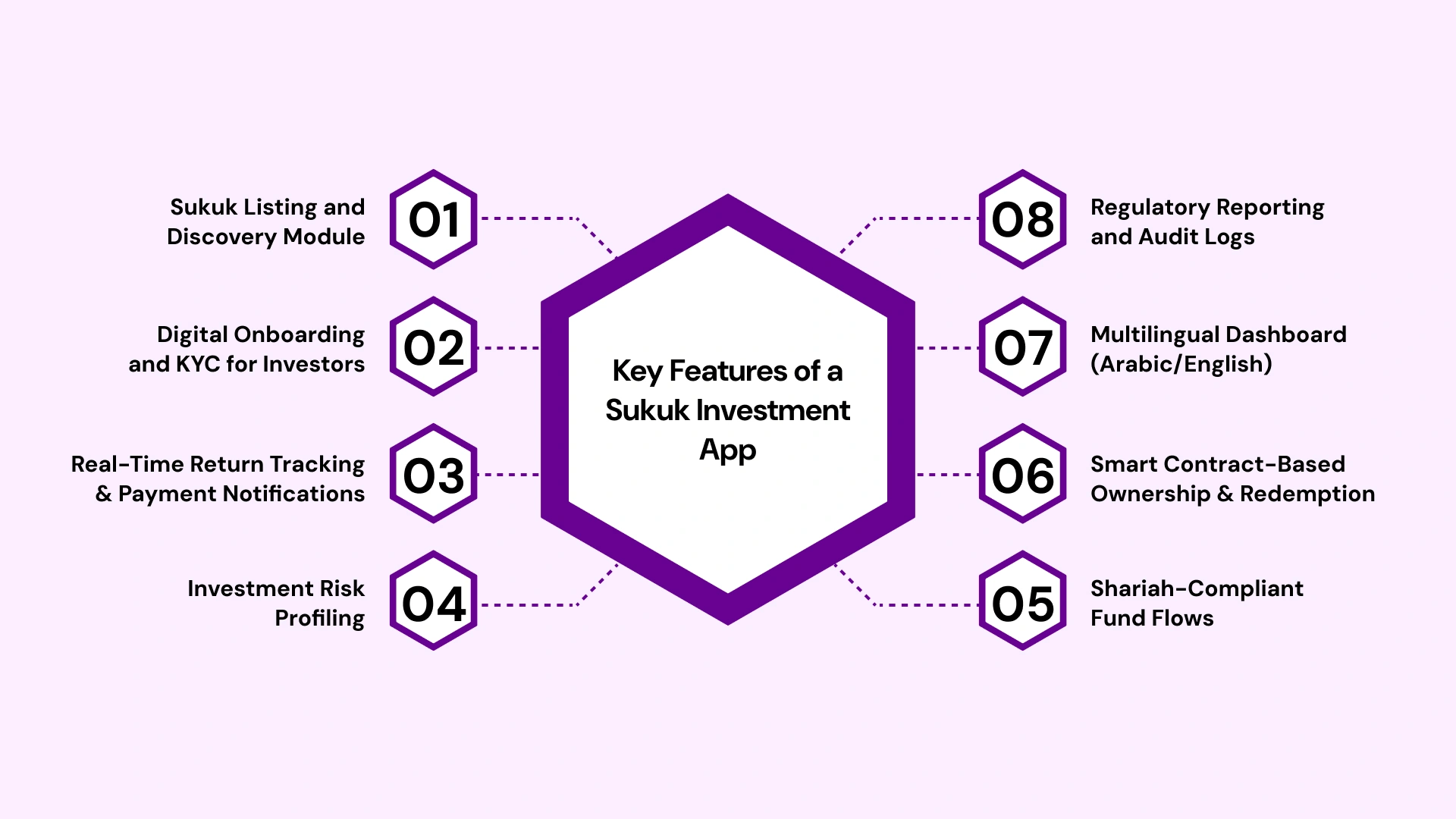
Sukuk Listing and Discovery Module
Enables users to browse available Sukuk offerings, filter by issuer type, tenure, expected yield, or risk grade. Listings often include issuer details, Shariah compliance certificates, and profit distribution schedules.
Digital Onboarding and KYC for Investors
Easy registration is one of the features of the development of Islamic bond trading applications. It is comprised of controlled uploading of digital documents, online verification of identity and biometric ID verification. It is also possible to match the system with national identity databases such as Absher to achieve regional KYC and AML compliance levels to support faster onboarding and regulatory alignment.
Real-time Return Tracking & Payment Notifications
Allows investors to track periodic profit distributions and capital repayment status. In-app and push notifications ensure users are informed about payout timelines and upcoming maturities.
Investment Risk Profiling
Guides users through a questionnaire to assess financial goals and risk appetite. The app can suggest Sukuk options based on the investor’s profile, aiding smarter portfolio decisions.
Shariah-Compliant Fund Flows
Transactions are structured to avoid interest-bearing mechanisms. Fund movements are aligned with Islamic financial principles and routed through vetted Shariah-compliant banking channels.
Smart Contract-Based Ownership & Redemption
Digital tokens or smart contracts are used to represent Sukuk ownership. This is essential for automating payouts and simplifying secondary market transactions, when available.
Multilingual Dashboard (Arabic/English)
A user interface designed to support bilingual navigation and contextual understanding, catering to the linguistic diversity in GCC markets.
Regulatory Reporting and Audit Logs
Built-in compliance tools that generate real-time logs for financial regulators and Shariah boards. These logs also support internal governance and external audit readiness.
Estimated Costs to Build Core Features Like Sukuk Capital App
Building a Sukuk investment app like Sukuk Capital involves multiple functional modules. The investment app development cost depends on whether you’re launching a basic MVP or a fully equipped platform with issuer tools, compliance features, and smart contract integrations. Below is a breakdown of costs based on individual features and their implementation scope.
| Feature | Description | Estimated Cost |
| Sukuk listing & discovery module | Enables users to explore, search, and filter available Sukuk offerings | SAR 75,000 – 131,250 ($20,000 – $35,000) |
| Investor onboarding & digital KYC | Secure registration, identity verification, and AML compliance | SAR 56,250 – 93,750 ($15,000 – $25,000) |
| Real-time return tracking | Shows expected and earned returns with transaction history and notifications | SAR 37,500 – 75,000 ($10,000 – $20,000) |
| Risk profiling engine | Assesses investor preferences and risk appetite to match suitable Sukuk | SAR 37,500 – 75,000 ($10,000 – $20,000) |
| Shariah-compliant fund management | Ensures revenue-sharing models without interest, aligned with Islamic finance | SAR 93,750 – 150,000 ($25,000 – $40,000) |
| Smart contract ownership & redemption | Digitises Sukuk agreements and automates redemption and profit sharing | SAR 75,000 – 131,250 ($20,000 – $35,000) |
| Multilingual dashboard (Arabic/English) | User interface in Arabic and English with personalised navigation | SAR 30,000 – 56,250 ($8,000 – $15,000) |
| Regulatory reporting & audit logs | Generates reports for compliance and maintains logs for auditing | SAR 45,000 – 93,750 ($12,000 – $25,000) |
How Much Does It Cost to Develop a Sukuk-Like App?
The estimated cost to develop an app like Sukuk Capital in Saudi Arabia ranges from SAR 300,000 to SAR 1.05 million (approximately $80,000 to $280,000). This estimate covers essential features such as Sukuk listings, digital onboarding, KYC compliance, investment dashboards, smart contract logic, and multilingual support.
To calculate the budget for your specific project, consider this formula:
Total Investment App Development Cost = Hourly Rate × Total Development Time
Approximate Hourly Rates in Saudi Arabia:
- Junior Developer: SAR 100/hour ($25/hour)
- Mid-Level Developer: SAR 115/hour ($30/hour)
- Senior Developer: SAR 130/hour ($35/hour)
- Shariah/Compliance Expert: SAR 190/hour ($50/hour)
Estimated Development Timeline:
- MVP version: 4–6 months
- Full-featured app: 7–10 months
Note: These are general estimates. The actual cost to develop an app like Sukuk may vary depending on the number of features, team composition, compliance needs, and deployment scope.
In the following sections, we’ll break down the cost to develop an investment app by complexity and project stages.
Cost to Develop an App Like Sukuk by App Complexity
Developing a Sukuk investment app involves different cost tiers based on platform scope, features, and intended users. Below is a breakdown of expected cost ranges based on complexity:
| App Scope | Key Features | Estimated Cost |
| Basic MVP | Investor dashboard, Sukuk listings, KYC, return tracking | SAR 300,000 – 375,000 ($80,000–$100,000) |
| Mid-Level App | Adds issuer onboarding, multilingual UI, basic smart contracts, and automated payment logs | SAR 450,000 – 675,000 ($120,000–$180,000) |
| Full-Featured Sukuk Platform | Includes AI profiling, auto-invest, issuer-investor hub, real-time notifications, and audit tools | SAR 787,500 – 1,050,000 ($210,000–$280,000) |
The actual cost to build a mobile app varies depending on tech stack, hiring model, team location, and regulatory scope.
Cost to Develop a Sukuk App by Development Stage
Understanding the cost structure by phase helps in managing budgets and setting realistic expectations. Below is a detailed breakdown by development stage:
| Development Stage | Key Activities | Estimated Cost |
| Planning & Discovery | Requirement gathering, scope planning, and roadmap setup | SAR 7,500 – 26,250 ($2,000 – $7,000) |
| UI/UX Design | Wireframes, design system, Arabic/English localisation | SAR 15,000 – 45,000 ($4,000 – $12,000) |
| Frontend Development | Investor/issuer portals, mobile interface (Flutter or React Native) | SAR 37,500 – 112,500 ($10,000 – $30,000) |
| Backend Development | APIs, database, return tracking, KYC, transaction logic | SAR 56,250 – 150,000 ($15,000 – $40,000) |
| Compliance Integrations | Shariah model, CMA alignment, e-signatures, audit trail | SAR 75,000 – 225,000 ($20,000 – $60,000) |
| Testing & QA | Manual/automated testing, bug fixes, device testing | SAR 18,750 – 37,500 ($5,000 – $10,000) |
| Deployment & Launch | Server deployment, app stores, DNS, analytics | SAR 7,500 – 18,750 ($2,000 – $5,000) |
| Post-Launch Support | Monitoring, security patches, and minor updates (monthly) | SAR 7,500 – 18,750/month ($2,000 – $5,000/month) |
Now that we have an idea of how much does it cost to develop a Sukuk-like app, we will dive into the factors that will influence the development costs.
Top Factors That Influence Sukuk App Development Cost KSA
Building a Sukuk investment app like Sukuk Capital involves a range of cost drivers. Each factor impacts development time, team structure, and technology investment. Below is a breakdown of the key contributors:
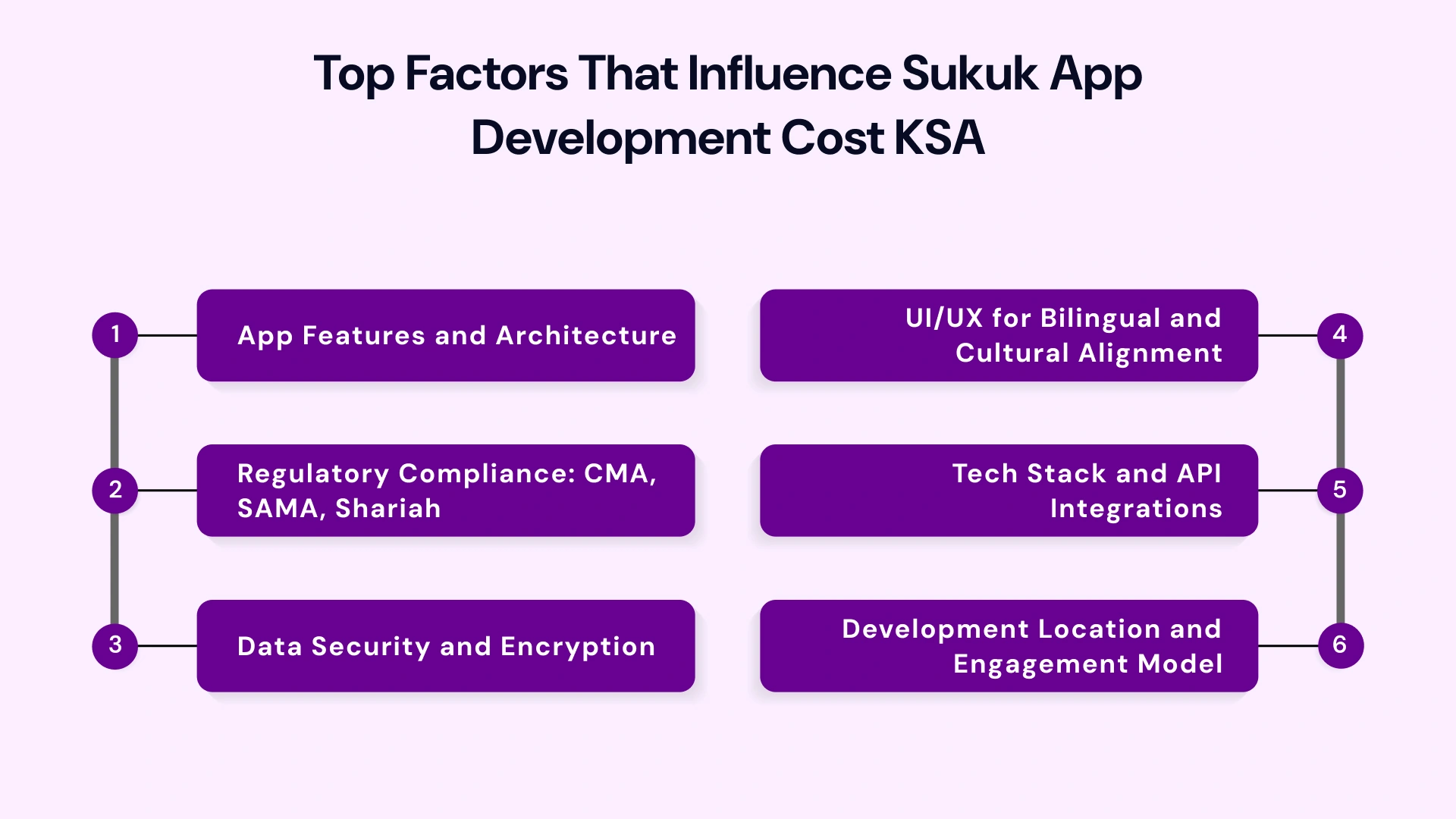
1. App Features and Architecture
The more advanced your app's features and user roles (such as investor, issuer, and admin), the higher the overall investment app development cost. If you plan to build an app like Sukuk in Saudi Arabia, incorporating complex modules will require significant backend logic, cloud infrastructure, and compliance integrations.
| Scope | Description | Estimated Cost (SAR/USD) |
| Basic Features | Listings, onboarding, KYC, returns view | SAR 150,000 – 225,000 ($40,000 – $60,000) |
| Mid-Level Features | Issuer onboarding, bilingual dashboard, and auto payouts | SAR 262,500 – 412,500 ($70,000 – $110,000) |
| Advanced Architecture | Smart contracts, risk engines, and investor profiling | SAR 450,000 – 750,000 ($120,000 – $200,000) |
2. Regulatory Compliance: CMA, SAMA, Shariah
To build an app like Sukuk in Saudi Arabia, you must align with regulatory bodies such as the CMA (Capital Market Authority) and SAMA (Saudi Central Bank), in addition to ensuring Shariah compliance. This means factoring in costs for legal consultations, certified Shariah audits, and integrated reporting workflows required to meet both financial and religious standards.
| Compliance Scope | Description | Estimated Cost (SAR/USD) |
| Basic Regulatory Alignment | KYC/AML, investor profiling | SAR 56,250 – 112,500 ($15,000 – $30,000) |
| CMA & SAMA Legal Consultation | Alignment with capital market and banking frameworks | SAR 112,500 – 225,000 ($30,000 – $60,000) |
| Shariah Compliance Integration | Fund flow checks, contract validation, e-fatwas | SAR 75,000 – 150,000 ($20,000 – $40,000) |
3. Data Security and Encryption
Given the sensitive nature of financial data, the cost to develop an app like Sukuk also depends heavily on how well you secure the platform. Implementing strong encryption, secure hosting environments, audit trails, multi-factor authentication, secure API calls, and transaction logging can significantly increase the overall budget, but they are non-negotiable when handling investor funds and regulatory data.
| Security Level | Features Included | Estimated Cost (SAR/USD) |
| Basic Security | HTTPS, login auth, password encryption | SAR 37,500 – 75,000 ($10,000 – $20,000) |
| Advanced Security | MFA, AES encryption, secure key vaults, audit logs | SAR 112,500 – 187,500 ($30,000 – $50,000) |
| Compliance Certifications | ISO 27001, SOC 2, data residency, penetration testing | SAR 150,000 – 262,500 ($40,000 – $70,000) |
4. UI/UX for Bilingual and Cultural Alignment
Designing for both Arabic and English audiences directly impacts the cost to develop an app like Sukuk. You’ll need to support RTL/LTR layouts, incorporate culturally appropriate iconography, and ensure usability across age groups. This requires specialised UI/UX design, bilingual content localisation, and thorough user testing, all of which contribute to higher design and development budgets.
| UI/UX Level | Scope | Estimated Cost (SAR/USD) |
| Basic Bilingual UI | Arabic/English toggle, RTL support | SAR 56,250 – 112,500 ($15,000 – $30,000) |
| Cultural UX Design | Icons, fonts, and navigation flows aligned with regional preferences | SAR 112,500 – 187,500 ($30,000 – $50,000) |
| Advanced UI Personalisation | Theme switch, dark/light modes, dashboard modularity | SAR 187,500 – 262,500 ($50,000 – $70,000) |
5. Tech Stack and API Integrations
To build an app like Sukuk in Saudi Arabia, selecting the right tech stack is key to maintaining scalability and performance. Integration with third-party API also adds to the development effort. Custom APIs, in particular, require additional time and resources, which can significantly influence your total development cost and timeline.
| Tech Component | Description | Estimated Cost (SAR/USD) |
| Standard Stack | Flutter/React, Node.js, Firebase, MongoDB | SAR 112,500 – 187,500 ($30,000 – $50,000) |
| API Integrations | Payment gateways, wallet services, and KYC platforms | SAR 75,000 – 150,000 ($20,000 – $40,000) |
| Advanced Stack | Microservices, GraphQL, smart contracts, analytics tools | SAR 225,000 – 375,000 ($60,000 – $100,000) |
6. Development Location and Engagement Model
Hiring a local team in Saudi Arabia may increase the Sukuk app development cost in KSA, but it comes with the advantage of local regulatory expertise, especially for CMA and Shariah compliance. On the other hand, offshore teams, while more cost-effective, require tighter oversight in project management and quality assurance to meet regional standards and timelines.
| Team Type | Hourly Rate Range (SAR/USD) | Monthly Cost Estimate (Full Team) |
| Saudi-based In-House Team | SAR 130 – 190 ($35 – $50) | SAR 150,000 – 262,500 ($40K – $70K) |
| Offshore (India/Eastern EU) | SAR 75 – 115 ($20 – $30) | SAR 75,000 – 150,000 ($20K – $40K) |
| Hybrid Model | Mix of local + offshore | SAR 112,500 – 187,500 ($30K – $50K) |
[Also Read: How Much Does it Cost to Build an App Like Dubizzle?]
Hidden Costs to Account For When Developing an App Like Sukuk
Beyond the core development cost, running and maintaining a Sukuk investment app includes several ongoing expenses that are often underestimated. These hidden factors can significantly affect the Sukuk app development cost in KSA, especially when accounting for recurring compliance audits, Shariah reviews, real-time data subscriptions, and customer support infrastructure.
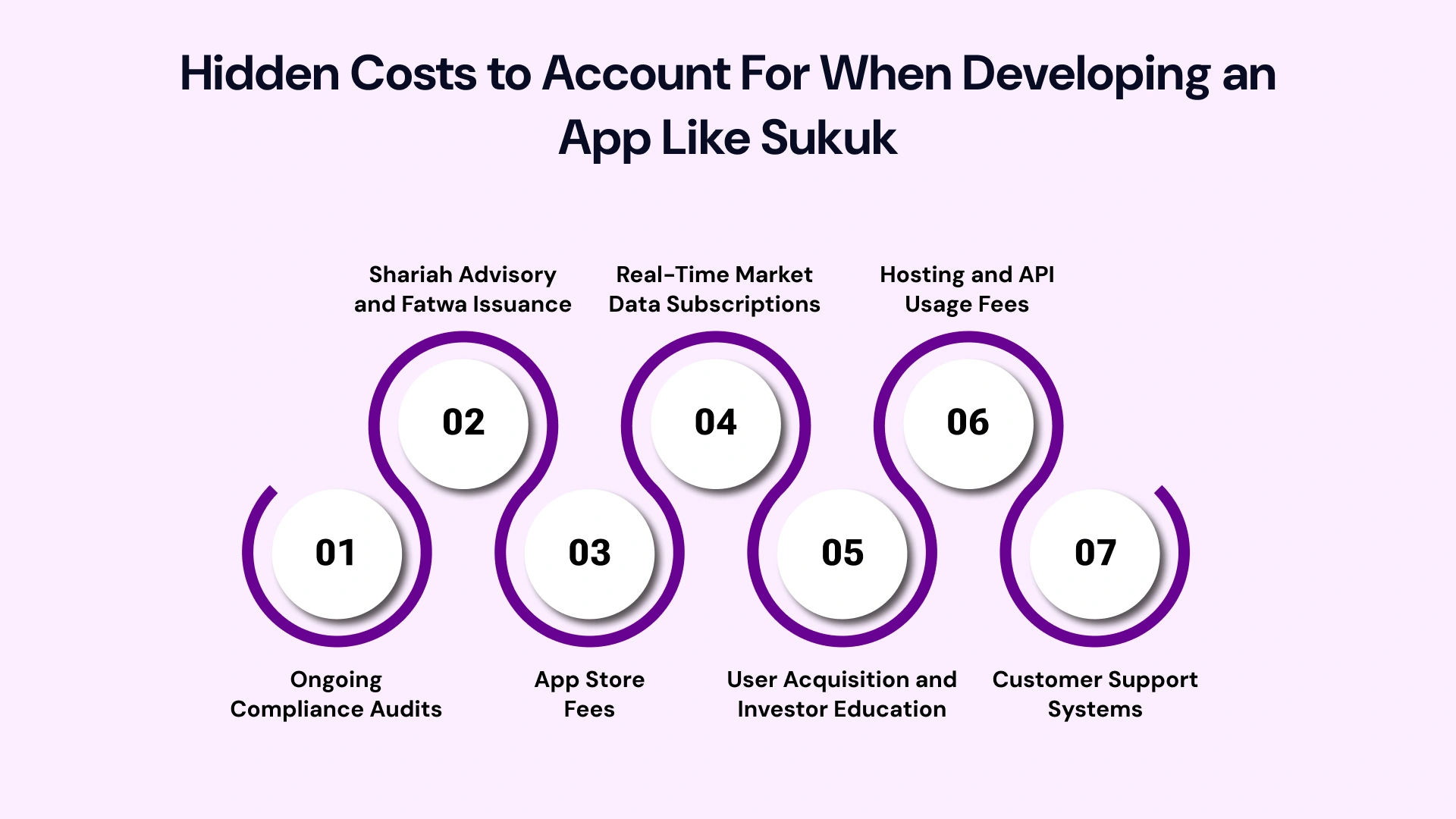
Ongoing Compliance Audits
Regulatory bodies such as the CMA in Saudi Arabia require periodic compliance audits to ensure the app aligns with financial and legal standards. These audits are necessary to maintain your license and credibility. Depending on how frequently these are required (quarterly or annually), businesses can expect to spend between SAR 18,750 and SAR 56,250 ($5,000–$15,000) per audit.
Shariah Advisory and Fatwa Issuance
Each investment offering on your platform must comply with Islamic finance principles. This involves reviews from certified scholars and issuance of fatwas validating Shariah compliance. These reviews are recurring and may cost between SAR 7,500 and SAR 18,750 ($2,000–$5,000) per product or contract.
App Store Fees
Submitting your app on platforms like the Google Play Store and Apple App Store involves both upfront and recurring fees. Apple and Google take 15–30% commissions on in-app transactions and charge developer fees of approximately SAR 375–750 ($100–$200) annually. This increases Saudi Arabia mobile app development costs.
Real-Time Market Data Subscriptions
For apps that display live Sukuk listings, market rates, or yield data, third-party data providers like Bloomberg, Refinitiv, or others charge monthly subscriptions. These can range from SAR 18,750 to SAR 75,000/month ($5,000–$20,000/month) depending on the granularity and frequency of data required.
User Acquisition and Investor Education
Educating users about Sukuk and bringing them onto your platform requires a steady investment in marketing, webinars, guides, and possibly influencer campaigns. For meaningful traction, especially in the GCC region, budgets of SAR 37,500 to SAR 112,500/month ($10,000–$30,000/month) are typical.
Hosting and API Usage Fees
Cloud hosting on platforms like AWS or Azure, along with APIs for payments, onboarding, and KYC, typically comes with usage-based pricing. As your user base grows, so investment app development cost, ranging between SAR 7,500 and SAR 22,500/month ($2,000–$6,000/month).
Customer Support Systems
Offering reliable user support means investing in helpdesk tools like Zendesk or Freshdesk, integrating chatbots, and hiring support staff. Monthly costs can fall between SAR 11,250 and SAR 30,000 ($3,000–$8,000), depending on how many users you serve and whether support is multilingual.
How to Reduce Sukuk App Development Costs
Building a Shariah-compliant investment app can be costly, but the Sukuk app development cost KSA can be optimised through strategic planning and efficient execution.
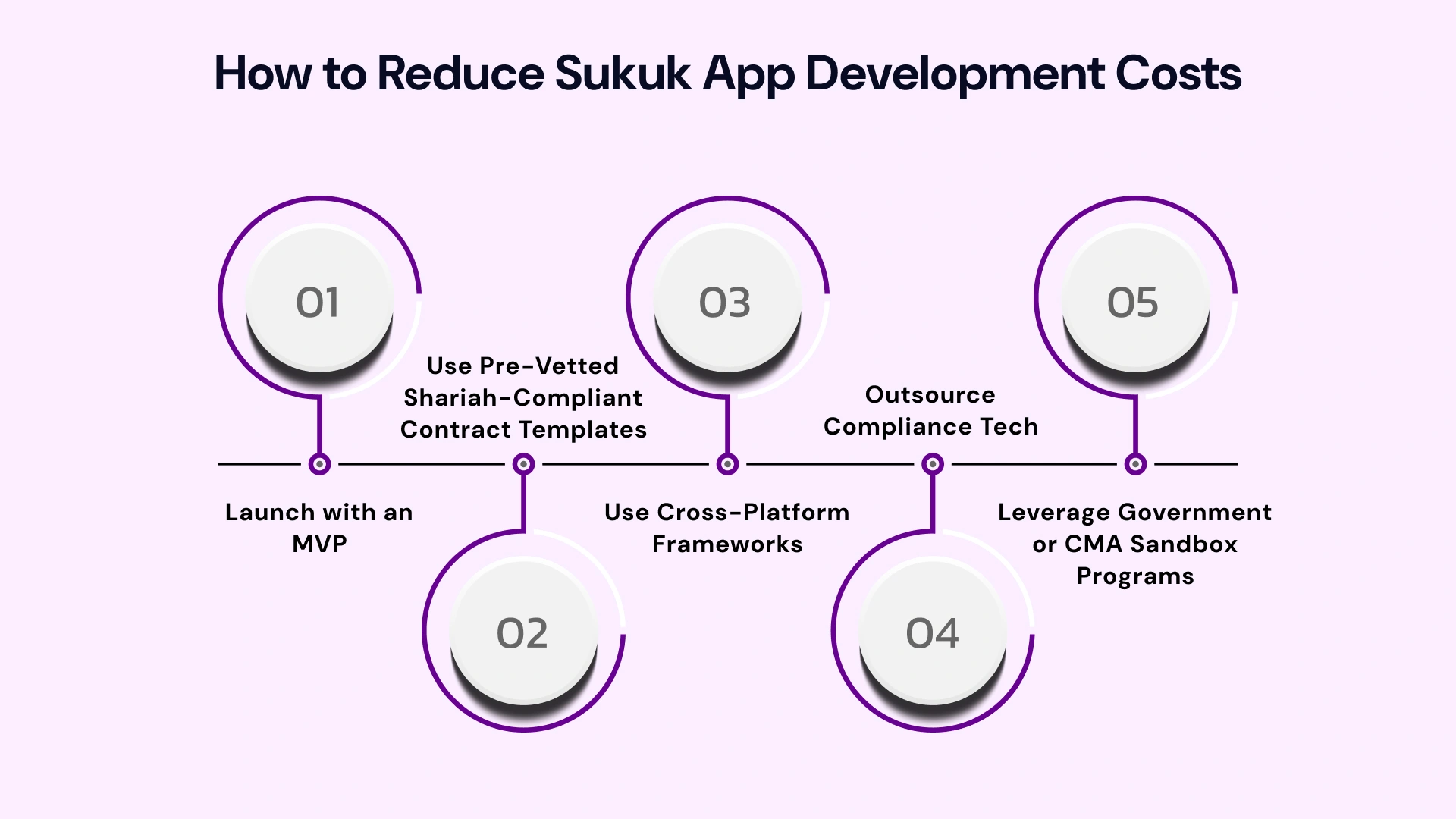
Launch with an MVP
Rather than building a fully featured app from day one, start with a Minimum Viable Product that includes only the core investor features, such as Sukuk discovery, KYC, and digital onboarding. You can expand to include issuer modules or advanced features like auto-investing in later phases. This keeps the initial fintech app development cost in Saudi Arabia between SAR 187,500 and SAR 262,500 ($50,000–$70,000).
Use Pre-Vetted Shariah-Compliant Contract Templates
Instead of drafting new contracts for every Sukuk issuance, rely on standardised templates already approved by certified Shariah boards. This reduces the legal turnaround time and lowers Sukuk app development cost KSA by minimising repetitive compliance expenses and speeding up product launches.
Use Cross-Platform Frameworks
Cross-platform frameworks like Flutter and React Native allow your team to write one codebase for both iOS and Android apps. This saves both time and budget, usually reducing fintech app development cost Saudi Arabia by 30–40% compared to native development.
Outsource Compliance Tech
Many SAMA-approved app developers already offer KYC, AML, and audit tools specifically designed for Islamic finance app development in KSA. Integrating their APIs is faster and more cost-effective than building compliance systems from scratch.
Leverage Government or CMA Sandbox Programs
Saudi Arabia’s Fintech Regulatory Sandbox allows startups to launch under relaxed regulatory conditions with oversight from the CMA. This can significantly reduce the Saudi Arabia mobile app development cost, especially for early-stage fintech apps. By operating inside the sandbox, startups can delay licensing expenses, streamline compliance efforts, and reduce the financial risks typically associated with full-scale launches.
How to Make Money from an App Like Sukuk
Building a Sukuk investment app isn’t just about enabling compliance and usability—it’s also about generating sustainable revenue. Here are the most effective monetization strategies used by platforms like Sukuk Capital in Saudi Arabia:
1. Transaction Fees
Charge a fixed percentage or flat fee on each successful Sukuk investment or redemption. This can apply to both retail and institutional users. For example, platforms often charge 0.5%–1.5% per transaction.
2. Listing Fees for Issuers
Allow corporations or government-backed entities to list their Sukuk offerings for a fee. These fees can be one-time, annual, or tiered based on the size or complexity of the issuance.
3. Subscription Plans
Introduce monthly or annual plans for investors or issuers to access premium features:
- Priority access to new Sukuk
- Detailed investment analytics
- Auto-invest options
- Portfolio tracking tools
4. Profit-Sharing Model
Some platforms earn revenue through a margin on the return generated from Sukuk pools, especially in aggregator or pooled-investment models.
5. Value-Added Compliance Services
Offer optional services like Shariah certification, legal review, or regulatory advisory for smaller issuers who lack an in-house compliance infrastructure. These can be priced per issuance or on a retainer basis.
6. White-Label or Licensing Model
Once your platform is stable, license the technology to other institutions (e.g., banks, wealth management firms) under a white-label model. This creates recurring income through SaaS-style pricing.
7. Educational Content & Webinars
Monetize investor education through pay-to-access learning modules, webinars, and certified training programs related to Islamic finance and Sukuk investment.
8. Affiliate Partnerships
Partner with financial advisors, Islamic scholars, or banks to bring users to your app—and offer commissions or revenue-sharing on new investor activity they generate.
9. In-App Promotions
Promote select Sukuk issuances or partner offerings through featured listings or banner ads. This provides visibility to issuers while generating additional revenue.
Tips to Build a Superior Sukuk App Than Sukuk Capital
Sukuk Capital has emerged as a leading platform for Islamic investments in Saudi Arabia. But as the digital investment space grows more competitive, there are meaningful ways new platforms can offer better user experience, functionality, and issuer tools while keeping Sukuk app development cost in KSA under control.
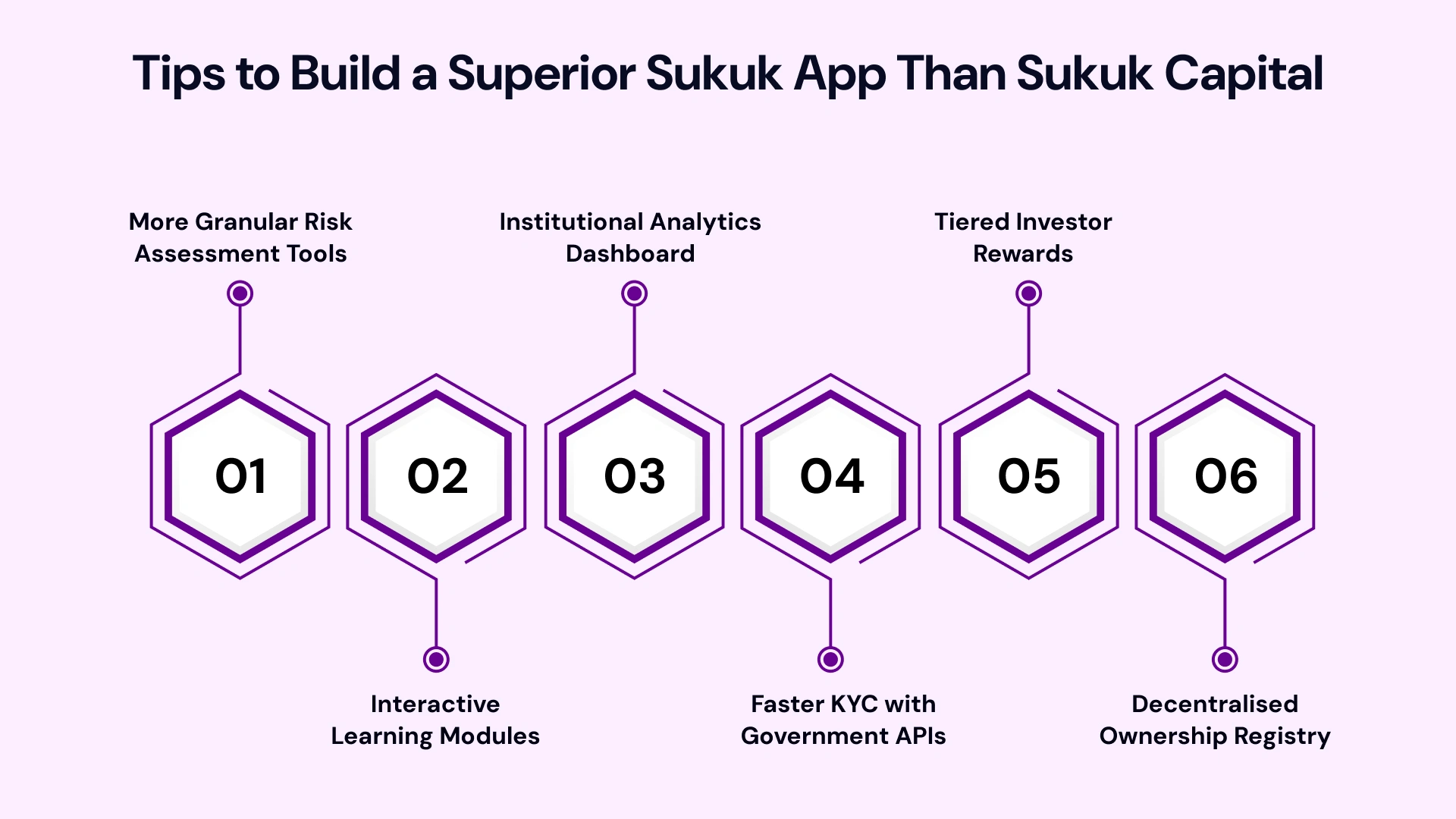
More Granular Risk Assessment Tools
Most current Sukuk apps offer basic profiling, such as age, income, and general investment experience. A more advanced approach involves analysing real-time transaction behaviour, historical investment data, and customised risk tolerance assessments to generate dynamic risk scores. A mobile app development company in Saudi Arabia can help implement these intelligent profiling systems.
Interactive Learning Modules
A large portion of the retail market in KSA is still unfamiliar with the structure and benefits of Sukuk. Embedding short video explainers, scenario-based tutorials, Shariah compliance guides, and quizzes can help build user confidence. This is especially helpful for first-time investors who want to understand before they commit.
Institutional Analytics Dashboard
Offer Sukuk issuers more than just a basic listing tool. Create a dedicated analytics dashboard that gives issuers access to real-time investor demographics, demand trends, historical Sukuk performance, and engagement metrics. This added functionality not only improves issuer decision-making but also justifies a higher Saudi Arabia mobile app development cost due to the need for data visualisation, real-time sync, and custom backend logic.
Faster KYC with Government APIs
Manual KYC processes delay onboarding and frustrate users. To build a financial investment app like Sukuk that delivers a smoother experience, integrate with official government systems such as Absher (Saudi Arabia's digital ID platform). This approach automates identity verification, reduces onboarding time from days to minutes, and ensures compliance with AML and investor screening regulations.
Tiered Investor Rewards
Introduce gamified or tiered investment experiences to reward long-term users. For instance, users who invest in multiple Sukuk can get early access to new issuances or enjoy reduced platform fees. These loyalty tiers increase engagement and reduce churn without requiring significant discounts or promotions.
Decentralised Ownership Registry
Rather than storing Sukuk ownership data on traditional servers, you can build a financial investment app like Sukuk using a blockchain-based ownership registry. This ensures instant verification, transparent ownership transfers, and an immutable investment history. It improves trust and accountability, especially for institutional investors and financial regulators.
Build an App like Sukuk with VLink
VLink brings deep fintech experience and a strong foundation in Islamic finance app development KSA. Our teams have collaborated with financial institutions across Saudi Arabia, the UAE, and Southeast Asia to build scalable, Shariah-compliant investment solutions.
We understand the unique infrastructure and regulatory requirements needed to develop apps that meet both Shariah and CMA standards. From smart contract integration to bilingual (Arabic/English) interfaces and automated audit reporting, our architecture is tailored to the Islamic investment app development ecosystem.
Whether you're serving retail investors or institutional Sukuk platforms, VLink’s best fintech app developers in Jeddah help you launch and scale with confidence, without compromising on compliance, performance, or user experience.










 Shivisha Patel
Shivisha Patel

















